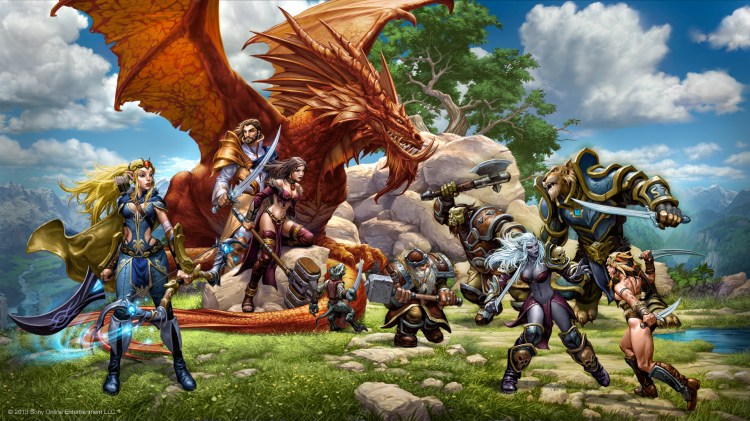“We desired to get rid of the static questgiver because it was a contrivance,” McPherson said of EverQuest Next. “But we did not want to eliminate the clarity of what the players should be doing. When the players enter the game, they’re going to be making choices: who they want to ally with, who they want to bind themselves to. You see content contextual to you and the decisions you’ve made.
“I log into the game, and because I belong to the Knights of Truth, who stand for justice and order, there’s content that is for me. When I arrive at a battlefront or a rallying call where my faction or my organization is involved, I will have very specific content.”
“We can generate content that matches your alliances,” Bura said. “If you want to help the dryads push back the dark spirits, you can because we made content that is well-suited for you.”
What you do in the fight will help determine its outcome, and it’s the outcome you’re after — not killing five things or collecting eight objects, they said. Orcs might be attacking a supply train, and your job is to see whether you can lend a hand. You do what you can in the 10 to 15 minute event, with no specific numeric objectives.
“It’ll be going to an area and then solving an event,” McPherson said.
A world that changes without you
The fun part is, that conflict will go on whether you’re there or not, as the NPCs play out their conflicting priorities. Come too late and you might find the caravan triumphant or in ruins. That will happen on battlefields both large and small.
“We may create events that players never see,” McPherson said. “The goal is that the world is evolving at a pace where if you’re gone for the weekend, things may have changed. You may have missed events.”
While some of those events may have major consequences, the three were quick to say safeguards are in place to prevent the game from being unplayable.
“Most of the time we don’t really care if the city falls or not,” Bura said. “Maybe you have to retake the city. Or maybe you have to help defend it. All that matters is why they did that.”
“We desired that this system be extremely open ended in its outcomes,” McPherson said. The capital city, with its newbie tutorials and other gameplay features, would be unlikely to fall — though it could be moved, they caution. “But in all other cases, the world is cyclical. If the bad guys take a city, the players can take it back.
“We will either set up situations where an enemy is allowed to take a city, or we’ll set up a mechanism where that isn’t possible. Our goal is not to make a world where through player inactivity or through player purposeful action that the world becomes unplayable.”
But players shouldn’t become complacent, Georgeson said.
“Our goal is also to make sure that players don’t know what we think unplayable is,” he said.
“The players don’t know whether that city can fall or not. We want the players to feel like anything can happen at any time.”
One goal: Spurring strategic discussions outside of the game
Some of those world events in EverQuest Next may be the result of things you’ve done elsewhere. McPherson said the game’s designers expect large-scale conflicts to be the result of player actions in the game and that some of those will be unintended.
One Kithicor Forest conflict, for example, happens as the result of players innocently helping a faction to rebuilt a city — which then triggers a terrible event.
“My desire is that on the forums and in the game, players are arguing with each other about what roles we should be taking,” McPherson said. “ ‘Hey, if we help the dark elves, something bad will be happening.’ We want that conversation to be happening outside of the game.”
Bringing role playing back to the MMORPG
Some of those fan discussions will be the result of different player priorities. Which factions a player chooses to ally with will be important, as will their alignment to good or evil. It’ll change what happens in the world, the types of missions they get, and how they’re treated by other players and NPCs.
“This is supposed to be a role-playing game, with a life of consequences,” Georgeson said. “If you are a really bad guy in the game, you shouldn’t expect to be able to hang around with paladins. If you want to hang out with your friends, you should hang out with friends who have similar goals. This is a role-playing game.”
That said, there is always the chance for redemption, Bura noted.
“Maybe grouping with someone who doesn’t share your goals is one way to build up relationships with a faction you wouldn’t have access to,” he suggested.
“You could be a bloodthirsty bad guy for the first six months of the game and then find a group of people you want to play with and change yourself,” McPherson said. “You could do the right thing. Or the wrong thing, depending on who you wanted to hang with.”
“Just because you’re a card carrying jerk who’s been following evil, doesn’t mean that you can’t group with the paladins,” Georgeson clarified. “You just can’t be surprised when the friends of the paladins react really negatively to you being around.”
On the bright side, with the new A.I. system, there’s a good chance you’ll be able to change their minds.
VentureBeat's mission is to be a digital town square for technical decision-makers to gain knowledge about transformative enterprise technology and transact. Learn More



